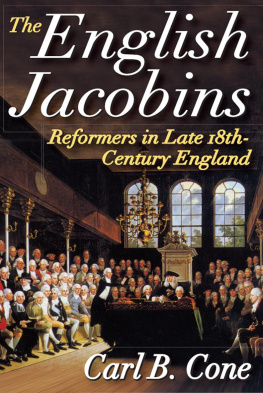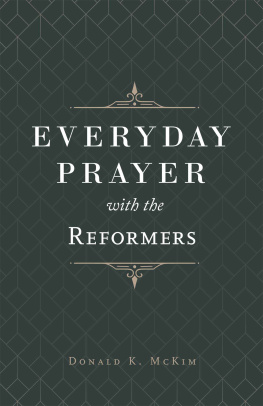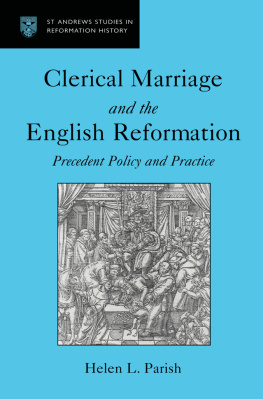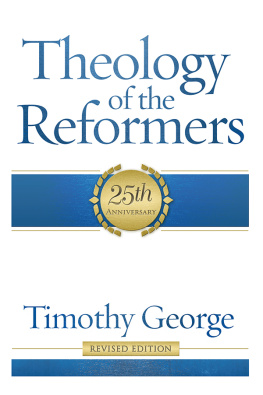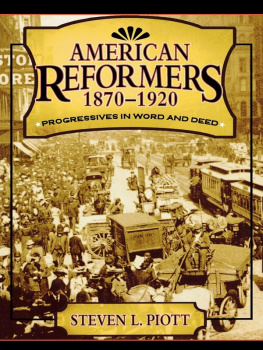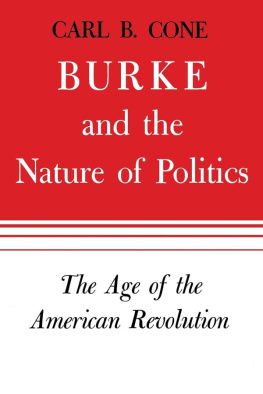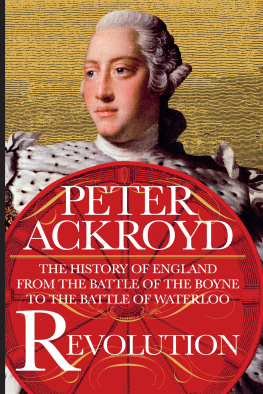The English Jacobins
The English Jacobins
Reformers in Late 18th Century England
Carl B. Cone
First published 1968 by Transaction Publishers
Published 2017 by Routledge
2 Park Square, Milton Park, Abingdon, Oxon OX14 4RN
711 Third Avenue, New York, NY 10017, USA
Routledge is an imprint of the Taylor & Francis Group, an informa business
Copyright 1968 by Carl B. Cone
All rights reserved. No part of this book may be reprinted or reproduced or utilised in any form or by any electronic, mechanical, or other means, now known or hereafter invented, including photocopying and recording, or in any information storage or retrieval system, without permission in writing from the publishers.
Notice:
Product or corporate names may be trademarks or registered trademarks, and are used only for identification and explanation without intent to infringe.
Library of Congress Catalog Number: 2009050634
Library of Congress Cataloging-in-Publication Data
Cone, Carl B.
The English Jacobins : reformers in late 18th-century England / Carl B. Cone.
p. cm.
Originally published: New York : Scribners, 1968.
Includes bibliographical references and index.
ISBN 978-1-4128-1329-7 (alk. paper)
1. Great Britain--Politics and government--1760-1789. 2. Great Britain--Politics and government--1789-1820. 3. England--Civilization--18th century. I. Title.
DA510.C68 2010
942.073--dc22
2009050634
ISBN 13: 978-1-4128-1329-7 (pbk)
CONTENTS
List of Illustrations
T HE original Jacobins, organized and militant, seized control of the French Revolution in 1792 and held it into 1794. They took their name from the Jacobin monastery adjacent to the Place Vendme in Paris where their leaders met.
But why the English Jacobins? One of them, John Thelwall, in his Rights of Nature (1796) gives us as much justification for the title as we need. Thelwall accepted the name because it is fixed upon us, as a stigma, by our enemies. Thelwalls us were persons who disagreed with Edmund Burke, the grey-headed procurator of proscription and blood, who believed, according to Thelwall, that nine-tenths of the population were insensate instruments of physical force, devoid of power or reason, undeserving of a voice in public affairs or a vote. The English Jacobins believed in the power of human reason; they thought that the people were capable of enlightenment; they demanded freedom of expression so that the opinions, not of a tenth-part, but of the whole nation, can be freely delivered, and distinctly heard. And so they desired a large and comprehensive system of reform, based not upon the authorities and principles of the Gothic customary but upon reason and the rights of man.
The English Jacobins desired change, said Burke. True, said Thelwall, And they ought to have it; and they must, or the nation is undone for ever. The need was simply stated to the English people. Compare what ye are with what ye have a right to be. When rights are denied, the people have a right to renounce the broken compact, and dissolve the system. Thelwall was not advocating bloody revolution. He abhorred the sanguinary ferocity of the late Jacobins in France. But he admired their political principles, especially their emphasis upon equality. He thought reform in England, through organization, agitation, and education of the people in knowledge of their rights was possible and that by these means it could be obtained without a September Massacre or a Reign of Terror. The people have the power to make government respect them. The force of an aroused and enlightened public opinion is effective under any form of government. The love of freedom exists naturally in the hearts of people; they only need to be awakened to achieve reform.
When reformed, government can properly get about its business of promoting the welfare and happiness of the whole. It does not require social upheaval or the destruction of property to help the laboring man gain the decent living he has a right to. Equality of rights consists not in equality of distribution; but in equal opportunities of benefiting by the things distributed. Regulation rather than confiscation of property, the abolition of special privilege, and the recognition of the true worth of labor would suffice. If Thelwall sounds pre-Marxian, it might be remembered that Adam Smith also talked about labor value.
Thelwall, like his Jacobin colleagues, was much clearer when talking about political rights than about social or economic change. Neither he nor they envisaged all of the implications that historians of a later time, with the advantage of perspective, might find in their remarks. There was a kind of millennialism in the Jacobins thought rather than scientific determinism. The well-being of men must follow upon political reform simply because the peoples voices and votes must give expression to their desires, and because government controlled by the people must give effect to their demands. How and in what manner the future would reveal. But that things would be better, the Jacobins never doubted. The crime of the Jacobin is, said Thelwall, that he looks forward to a state of society more extensive in its refinementsmore perfect, and more general in its improvements, than any which has yet been known.
Jacobinism then was a state of mind, a cluster of indignant sensibilities, a faith in reason, a vision of the future. It was also individuals and groups among whom Thelwall admitted there were many different opinions as to the extent of change that was needed. English Jacobinism was not monolithic. The forms it took, the desires it expressed, the demands it made, the internal agreements and disagreements it revealed will be discussed in this book. If it turns out that the emphasis is upon the efforts for parliamentary reform, one remembers Thelwalls assertion that a large and comprehensive system of reform was the first object of the English Jacobins.
A NOBLEMAN, a gentleman, a yeomanthat is a good interest of the nation and a great. It was also the supreme interest in the ranked and ordered society of pre-industrial England because it was synonymous with land and the social status that land conferred. When a squire of Huntingdonshire, Oliver Cromwell, was Lord Protector of England, he opened the session of Parliament on September 4, 1654, with these words and went on to explain that he had preserved this good society from that levelling principle which tended to the reducing all men to an equality.
Equality, political or social or economic, England neither knew nor desired. Seventeenth century revolutionaries who mythologized the history of the Anglo-Saxon period, as they did Magna Carta, and professed to see in pre-Norman England a golden age of peasant democracy did not express the substance of English social philosophy. Yet this Gothic myth lived on. It inspired the friends of freedom who gathered on June 2, 1773, at the Standard Tavern in Leicester-fields, London, to reaffirm their devotion to liberty and a free constitution, symbolized by the head of Alfred the Great engraved on the societys silver cup. Twenty years later when the British Convention of the Delegates of the People associated to obtain Universal Suffrage and Annual Parliaments met in Edinburgh, a delegate from London, Joseph Gerrald, demanded the restoration of Englishmens ancient rights. Before the Norman conquerors destroyed the goodly fabrick of the Anglo-Saxon constitution, every man had a voice in choosing his representatives. If Gerrald was vague about the folkmootes attended by these representatives, he was certain that the concurrence of the people was necessary to the administration of government, and they obeyed the laws which they themselves had made.

